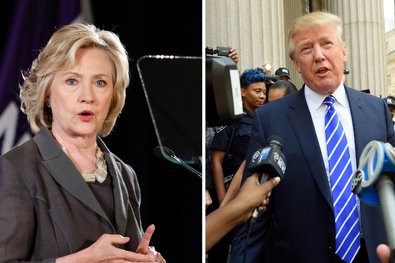
The Graying of the President — Are Candidates Too Old?
The field of presidential candidates is even too old for a 102-year-old woman. “I think we need young blood,” the centenarian, June E. Cornelius of Iowa told CNN. The leading Republican presidential candidate and the three Democratic candidates will all be 70 or almost 70 on Inauguration Day. Is that too old? Should the age of a presidential candidate matter?
* gray = 백발이 되다/ presidential candidate = 대선후보, 대통령 후보자/ young blood = 젊은 사람들; 청춘의 혈기/ centenarian = 나이가 100세인[100세가 넘는] 사람/ In auguration Day = 대통령 취임식 날
 대통령 후보의 (많은) 나이가 문제가 되나요?
대통령 후보의 (많은) 나이가 문제가 되나요?
1. Judge Their Health, Not Age, But Use Good Sense
The nation would have been deprived of good leaders if some candidates' conditions had been publicly known. Some, though, were too old or sick.
2. With Age Comes Wisdom, and Some Concerns
Risks of mental impairment can increase with the years, but effects are variable and many gain in knowledge and resilience as they get older.
3. America Deserves a New Generation of Leaders
The baby boomers have had their turn. We need candidates with vigor. Besides, if they have Donald Trump, gives us Kanye West.
4. Candidates’ Ideas, Not Years, Matter to Young Voters
People notice a candidate's age, and may comment on it, but a number can’t matter to voters the way tangible policy proposals can.
Sample Essay
With Age Comes Wisdom, and Some Concerns for Candidates
What are the odds of a president’s cognitive abilities declining substantially while in office?
The Constitution has a lower age limit of 35, but no upper age limit. Even one of the 55,000 American centenarians alive today could still legally run for president.
Some have expressed concern that an older president could become cognitively impaired, forgetful and inattentive. Indeed, aging — as well as age-related diseases including hypertension, mini-strokes and diabetes — can be associated with reductions in brain volume and changes in the connections between brain cells. This can lead to a decline in mental quickness, attention, memory and the capacity to learn new information.
Even among high functioning subjects over 65, new scans suggest that about 20 percent, usually those with a family history of dementia, have early signs of Alzheimer’s in their brains. Moreover, this subset of individuals, despite their high scores on memory and attention tests, seem to have an increased risk for developing mild cognitive impairment – in one preliminary study that risk is almost 25 percent over 18 months.
While candidates usually release their physical health reports, should they be required to undergo and disclose cognitive test results? At this time, there is no perfect predictive test for dementia but many are in development. And new programs that can analyze people’s speech patterns may soon make it possible for early signs of dementia to be detected passively simply by analyzing transcripts of debates or media interviews.
The good news is that the effect of age on the brain is highly variable and many other individuals, due to their genes and healthy lifestyles, show very little change in cognition with aging. Thus, individual candidates who have been sharp and attentive in the eyes of the public and media for months or years leading up to Election Day, and whose medical and family history does not suggest an increased risk, are highly unlikely to decline in four years.
There are also upsides to aging: wisdom, knowledge and emotional resilience get better with age and experience. Warren Buffet, at the age of 85, would still be a highly viable candidate, should he chose to run.
As Henry Ford noted, "Anyone who stops learning is old, whether at 20 or 80. Anyone who keeps learning stays young.” We should shift the debate away from worrying about the age of our candidates and focus instead on their cognitive skill sets and practical wisdom.





![]() 대통령 후보의 (많은) 나이가 문제가 되나요?
대통령 후보의 (많은) 나이가 문제가 되나요?






